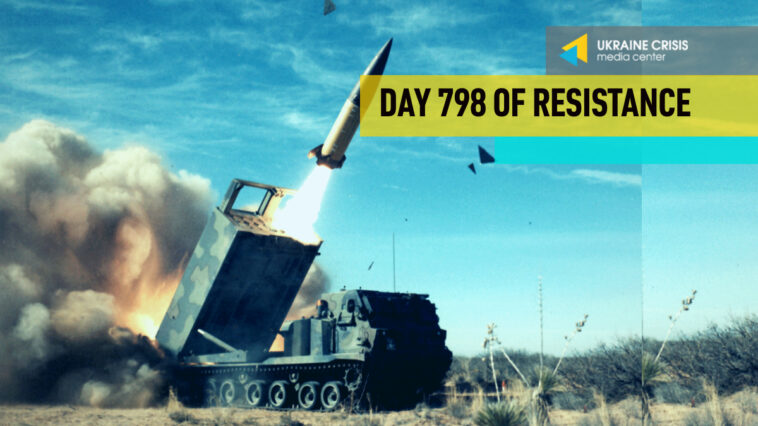Some allies have lifted restrictions on Ukraine using weapons to target military sites inside Russia, Latvia’s Foreign Minister says. The Ryazan oil refinery was hit by Ukrainian drones overnight. The first F-16 fighter jets could be delivered to Ukraine after Orthodox Easter.
Some allies have lifted restrictions on Ukraine using weapons to target military sites inside Russia, Latvia’s Foreign Minister says
Some allies have sent weapons to Ukraine without asking Ukrainians not to use them to hit military targets inside Russia, Latvian Foreign Minister Baiba Braže told European Pravda in an interview published Wednesday.
Strikes at military sites in Russia from which it launches attacks on Ukraine, are Ukraine’s legitimate targets under international law, Braže said.
Answering a question on whether the allies’ stance to provide weapons to Ukraine with conditions not to use them to hit targets inside Russia could change, Braže said that it is already changing.
“There are countries that have provided weapons to Ukraine without [such] conditions,” she said.
She added that in those cases the restrictions on how Ukraine uses weapons were lifted without public announcement.
Earlier, NATO Secretary General Jens Stoltenberg said that Ukraine has the right to self-defense “that also includes striking legitimate military targets outside Ukraine.”
Ryazan oil refinery hit by Ukrainian drones overnight
An oil refinery in Russia’ Ryazan was hit by drones overnight on Wednesday, causing a fire to a crude oil refining facility, the Russian Telegram news channel Astra reported.
There were no reports of fatalities.
Crude oil units are key elements of refineries. They are tailor-made and cost tens of millions of dollars.
The attack was orchestrated by Ukraine’s military intelligence agency, intelligence sources told RBC Ukraine. They confirmed that the refinery had sustained damage.
Ryazan’s regional governor, Pavel Malkov, said the region was attacked by drones. One drone was reportedly shot down.
Russia’s defense ministry said the air defenses intercepted a total of six drones overnight.
The Ryazan refinery, Rosneft’s biggest one, was damaged by another Ukrainian drone strike on March 13, 2024. Two crude oil units were then halted. The facility refines about 12.7 million metric tons of oil a year, or 4.6 per cent of the Russian total, according to industry sources, Reuters said. The Ryazan refinery has a capacity of 17.1 million tons a year and is a major facility focused on making fuel for exports.
Oil-processing has been a target of Ukrainian drone attacks since late January. In March, Vasyl Malyuk, the head of the Security Service of Ukraine, said the agency had carried out at least 13 successful attacks on Russian oil refineries during the war. The strikes caused a 12 per cent decrease in Russia’s oil extraction and refining, he added.
A wave of Ukrainian drone strikes on oil refineries deep inside Russia has left the Kremlin running low on petrol, Politico said on Tuesday. Diesel prices for Russian consumers have skyrocketed, rising almost 10 percent in the past week alone. Petrol costs have also hit a six-month high, up more than 20 percent from the start of the year, the article reads.
First F-16 fighter jets could be delivered to Ukraine after Orthodox Easter
The first F-16 fighter jets could be delivered to Ukraine’s air force after Orthodox Easter, spokesperson for the Ukrainian Air Force Command, Major Illya Yevlash said on television Wednesday.
Answering a question on whether there is a date when the first F-16s could arrive in Ukraine, Yevlash said: “Yes, it’s after Easter.”
He added that the Ukrainian Air Force “does not treat it as the final one” after the dates have changed several times.
“Our task is to work with what will be sent to us. We are not directly responsible for the delivery, that’s something to ask the top military and political leaders about. When the first fighter jets arrive in Ukraine, we will definitely announce that,” he said. This year, for Orthodox Christians, Easter falls on May 5.
Through the Transparency Lens: Revealing Ukraine’s Most Open Cities. Ukraine in Flames #605
The full-scale war started by Russia has demonstrated that decentralization in Ukraine works. It was the possibility and ability of local authorities to independently make critical and quick decisions that helped many cities withstand the initial attacks and somehow improve the lives of their residents. Transparency is a necessary condition for stability, development, and efficiency, particularly during wartime. In times of limited resources, increasing challenges, and growing demographic challenges, it is crucial to be adaptive, efficient, transparent, and accountable. Watch Ukraine in flames #605 to find out more about the state of transparency in cities during a full-scale war and how to improve it.
Guests:
- Allan Pagh Christensen, Head of the EU Anti-Corruption Initiative
- Pavlo Kuzmenko, Mayor of Okhtyrka
- Andriy Sadovyi, Mayor of Lviv

